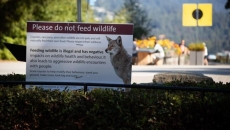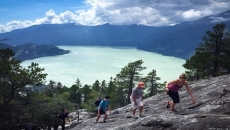OTTAWA - A new report says the country will need roughly $2 trillion to put the economy on a path to net-zero emissions in 30 years, including government spending on things like skills training and backstops to prod the necessary investments.
The report from RBC Economics estimates governments, businesses and communities would have to spend at least $60 billion annually to cut emissions by 75 per cent of current levels and reach the 2050 target of net zero.
Money will be needed to build out the electricity system to handle the expected rise in electric vehicles, which will also need some subsidies to get them off assembly lines and onto Canadian roads, the report says.
There will also have to be investment in retrofitting old buildings faster than current federal plans predict, retraining 100,000 workers with new skills for fast-growing green sectors, and skills training programs to add 200,000 more into the labour force by 2030.
The numbers add up to a massive effort to meet the Trudeau Liberals' short-term and long-term promises on climate change, but one the Royal Bank report estimates is possible if the government eyes a few key areas.
"It's not about ideology, it's about math. And we've done the math and said, OK, here is how we can get those numbers down towards zero, and this is what it is going to cost," said John Stackhouse, senior vice-president in the office of the CEO at Royal Bank.
"We think that it's doable. So let's focus in a very kind of business-minded way on the key drivers of emissions change."
Parliament approved legislation last spring that required the country to eliminate as many greenhouse gas emissions as possible, and capture whatever is left to get to net zero by 2050.
The Liberals haven't outlined the course to the long-term goal, and won't before a United Nations climate change conference, known as COP26, looming at the end of the month in Glasgow, Scotland.
The government has increased its emissions-reduction targets for 2030 as required by the climate agreement.
Internal government documents suggest the Liberals are acutely aware of the cost to shift the country to net zero and have looked to push banks and other private sector investors to help with funding and financing.
Finance Minister Chrystia Freeland's officials wrote in a September 2020 briefing note that the country's financial sector, including banks, "will need to play a major role" to create a net-zero economy. The briefing note created ahead of Freeland's meeting with bank CEOs also noted how their institutions needed to do more to "foster the right conditions to support the acceleration of sustainable investment."
Unlocking some of the needed spending will require federal politicians to create new platforms to channel private investment into green endeavors that may be akin to the Canada Infrastructure Bank.
The Liberals created the agency in 2017 to use federal dollars as a way to entice funding from private-sector investors, but its efforts and existence have become highly politicized with vows from the NDP and Conservatives to dismantle it if either are elected to govern.
Stackhouse said the country needs organizations similar to the infrastructure bank that can be semi-autonomous in terms of investment selections, but subject to government oversight.
Whatever gets created to spur investment has to survive successive governments through to 2050, and should be depoliticized for a better chance of success, he said.
"This is a 30-year project. There will be different governments during those 30 years. So let's create entities that can channel both public investment and crowd-in private investment to focus on the key strategic drivers," Stackhouse said.
But the report also warns of moving too fast, too soon. If there was a sudden and severe decline in oil and gas production, government revenues would fall by about $8 billion annually, which the report says could hamper, not help, the transition.






